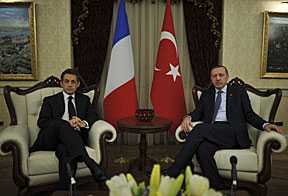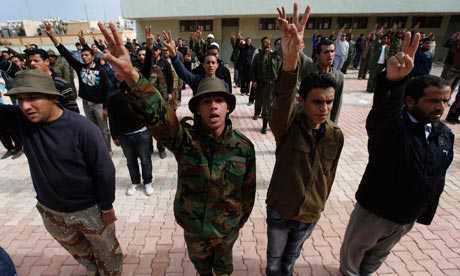The Times (UK), 5 April 2011, p. 1-19
Norman Stone *
A slow, draconian process of modernisation and a hostile attitude to Islam is no model for the Arab world
Odd to think, but we are at the 100th anniversary of an event involving Libya that precipitated a world war. In October 1911, the Italians invaded the Turkish possession; the defeat of the weakened Turks encouraged the Balkan nations to attack the last outposts of the Ottoman Empire in Europe, ultimately ending in the outbreak of the First World War.
Ten years down the line, Kemal Atatürk expelled the last occupying forces that were trying to divide up what was left of defeated Turkey, removed the Sultan and, in 1923, established the Republic of Turkey.
Atatürk said explicitly that Turkey had to modernise. And, with leaps and lags, Turkey has largely done so.
Democracy is well established and much of its economy has reached the levels of Mediterranean Europe, though there are large patches of backwardness in the southeast. Such is its success that outsiders now talk of the « Turkish model » as the future for Egypt and the rest of the Arab world.
This is a far-fetched notion. Turkey has been westernising, autonomously, for nearly two centuries. But it did so, Western advocates should note, in authoritarian fashion.
Until the 1950s, there was a single-party regime, though there were limits to the repression. (True, they put their leading poet, Nâzim Hikmet, into prison, but he did provoke it, going down to the docks to preach communism to the Navy, even after his cousin, the Interior Minister, told him privately that they would have to arrest him. He then faced an absurdly long spell in prison, where he was subjected to a most cruel punishment: his former wife was allowed to come for the weekend.) Democracy eventually did come about, but has only really worked in tandem with the steady economic progress which has occurred since the last serious military coup, in 1980. Its progress exactly matches Francis Fukuyama’s argument that you can afford democracy when your GDP per head reaches a level of around $7,500.
Nowadays there are more than 80 million Egyptians, mostly crowded into the Nile Delta and Cairo, and there is a gigantic problem of youth unemployment throughout the Arab world. Even the strongest military regime would struggle to do more than keep order and hope vaguely that economic progress will come about.
So what else does the Turkish model require? The most important element is state control of religion, to curb the wild men, of whom Islam generally produces a great deal too many. Religion in Turkey is strictly overseen by a central office, which even dictates the shape of mosques. Whether this would go down well in the Arab world is questionable.
Much from the Atatürk state clashes with Islam as practised elsewhere. His republic’s symbol was the hat, introduced to replace the Ottoman fez and the Islamic turban in 1925. Last month’s cover in my Atatürk calendar has the great man opening a model farm that year with ladies in cloche hats, some maybe on their way to dancing the Charleston.
That revolutionary step was just one of many. Arabic words were replaced or just dismissed from the dictionary; the script was made Latin, rather than Arabic, almost overnight in 1928 — a move that counted in some eyes as blasphemous, since the language and script of the Koran expressed the word of God. Similar blasphemy occurred when the ezan, the call to prayer, was read out in Turkish. Peasants were turned away if they arrived in Ankara dressed in traditional garb. A Soviet system of « people’s houses » spread in the countryside, especially to show women that they did not have to be domestic servants.
A new version of Turkish history was taught in schools, putting the country at a distance from its Ottoman identity. Secular Turks looked on its Islamic past and the Caliphate as republican Frenchmen or Italians looked on the Catholic Church: as the enemy. Turkey was created, in other words, more or less as an express rejection of the world to east and south — something that will have been noted by Arab nations.
The Government of Recep Tayyip Erdogan, Turkey’s moderately Islamist Prime Minister, comes from another tradition, one in which the Caliphate counts the most. His appeal to common Islamic brotherhood is not empty, and most recently it has been used on the Palestinians’ behalf.
But Arab-Turkish relations are never truly warm; many Turks are dismissive of the Arabs, and many Arabs would be dismissive of the so-called Turkish model. And on Israel Turkey is divided, because a great many Turks would associate Hamas with the PKK, the Kurdish separatist fighters. The much-vaunted pan-Islamic co-operation never gets anywhere.
Necmettin Erbakan, Turkey’s first Islamist Prime Minister, who held office for a year in 1996-97, dreamt up an Islamic foreign policy and lined up with several lovelies from that world — starting with Colonel Gaddafi. But during a trip by Erbakan to Tripoli, Gaddafi spat in the soup and denounced the Turks for not treating the Kurds properly. Erbakan’s second in command then denounced Gaddafi as a « bare-arsed Beduin ». So much for religious solidarity.
Now, just as the world looks to Turkey as an example for the Arabs to follow, Turkey’s own model is turning rather sour. Recently there was a huge demonstration for journalistic freedom in the centre of Istanbul, following the heavy interrogation and, in some cases, imprisonment of some 4,000 journalists.
Visitors to the country might not recognise the problem, but secular Turks are worried at « the desecularisation of modern Turkey » because Islam has been spreading: the calls to prayer, which ought to be made by a gentle human voice, now come bullyingly over megaphones in many quarters of Istanbul.
Understandably, the Turks wonder quite what « the Turkish model » is supposed to be now. For the educated classes it is obvious enough — the Atatürk state. Almost by definition, that state is not Muslim, let alone Arab.
Should a a tension arise between nationalism and Islam, then in Turkey nationalism would probably win.
Atatürk, when asked to describe the Turkish identity, just shrugged his shoulders and said, « We are similar to ourselves », and that is good enough to be going on with. The Turkish Model will stay Turkish.
* Norman Stone’s latest book is Turkey: A Short History (Thames and Hudson)






